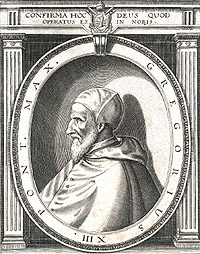 On
May 13, 1572, Ugo Boncompagni was elected Pope without delay or difficulty. He
chose to be called Gregory XIII. Born at Bologna on January 1, 1502, he studied
and then taught law at the city's famous university. In 1539 he entered the
papal service. He served Paul III and Pius IV at the Council of Trent. He was
made a bishop by Paul IV and a cardinal by Pius IV.
On
May 13, 1572, Ugo Boncompagni was elected Pope without delay or difficulty. He
chose to be called Gregory XIII. Born at Bologna on January 1, 1502, he studied
and then taught law at the city's famous university. In 1539 he entered the
papal service. He served Paul III and Pius IV at the Council of Trent. He was
made a bishop by Paul IV and a cardinal by Pius IV.
He had not always lived up to Christian standards, but after his
ordination he proved to be an excellent prelate. At the papal court he was
closely associated with St. Charles Borromeo, whose example was a shining
beacon. Gregory XIII was not particularly successful in his political ventures.
He hailed the massacre of St. Bartholomew with a Te Deum and a medal, but what
the Pope celebrated was the news that the king had been preserved from a
Huguenot conspiracy. The butchery he deplored even with tears. He tried hard to
put new life into the league against the Turks, but Venice made a separate peace
with the Sultan. He tried to help poor Ireland groaning under the Elizabethan
terror, but again he failed. The erratic Stukely sent to Ireland, ended up in
Africa, and the galiant Fitzmaurice expedition was bloodily crushed. Nor was
Gregory a great success as ruler of the papal kingdom. His financial policy was
a failure, and he was quite unable to cope with the impudent bandits who plagued
the territory.
Gregory gave a great gift to civilization when in 1578 he
introduced the reformed calendar which bears his name. He also did much to
beautify Rome. But a pope's interests are chiefly spiritual, and here Gregory
shone. His life, simple and pious gave great edification. He devoted himself to
carrying out the reforms of Trent. Gregory especially interested himself in the
training of good priests. He personally either founded or supported twenty-three
seminaries, including the English College and the German College. He erected a
fine new building for the Jesuits' Roman College, thenceforth known as the
Gregorian University. Gregory was a careful watchman over the purity of the
faith. He condemned the errors of Baius, a Louvain professor, and kept a sharp
eye on heresy. But his wide vision made him keenly interested in the positive
spreading of the faith. In Europe he sent missionaries to England and Sweden. To
Ivan the Terrible in far-off Muscovy he sent a legate. On the global front the
Pope was consoled by favorable reports from Japan, the Philippines, India,
Mexico, and South America. A picturesque event highlighted the intense
missionary activity of the reign when Japanese envoys from the Daimios of Bungo,
Arima, and Omura visited Rome to venerate the Holy Father. Gregory was
delighted, and the envoys edified all by their sincere piety and charming
manners. Gregory XIII died April 10, 1585. His name is enshrined in the calendar
we use today and the university which has alumni all over the world.
Excerpted from "Popes
Through the Ages" by Joseph Brusher, S.J.

